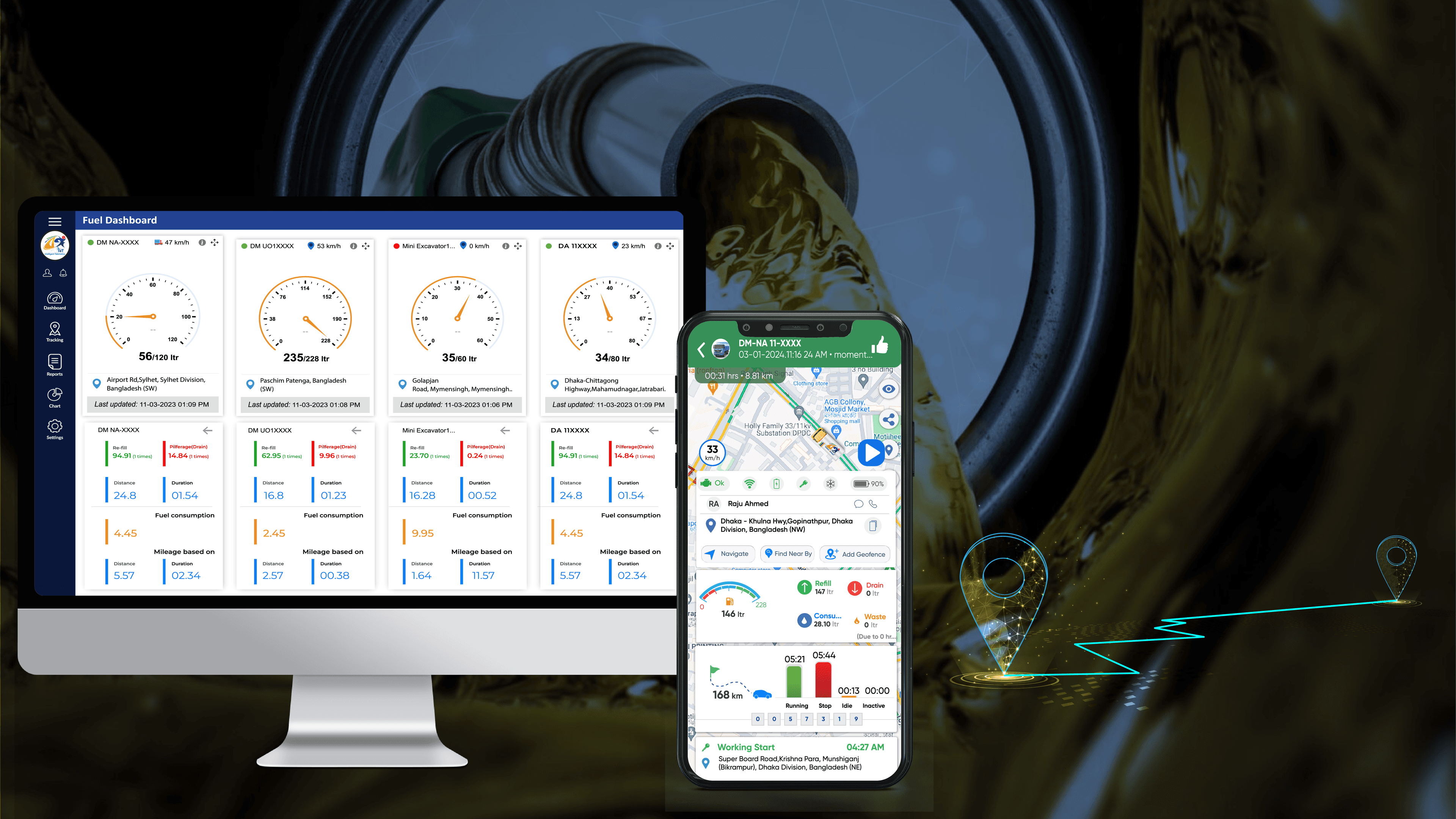In the ever-evolving landscape of transportation and fleet management, the quest for precision in fuel measurement has become paramount. The key to achieving maximum accuracy (99.5%) lies in the integration of intelligent software and dynamic algorithms into fuel management systems. This blog explores the indispensable role these technologies play in revolutionizing how we monitor, analyze, and optimize fuel consumption.
The Power of Intelligent Telematics Software and Dynamic Algorithms in Achieving 99.5% Accuracy
Intelligent telematics software refers to a sophisticated and advanced system that combines telecommunications and information technology to enable comprehensive and intelligent monitoring, tracking, and management of vehicles, assets, or equipment. This software utilizes a range of technologies, including GPS (Global Positioning System), sensors, and communication devices, to gather and transmit real-time data from the field to a centralized platform. The intelligence in telematics software comes from its ability to analyze and interpret this data, providing valuable insights and actionable information.
Key features of intelligent telematics software include:
- Real-Time Tracking
- Data Collection and Analysis
- Remote Diagnostics
- Safety Monitoring
- Fuel Management
- Geofencing
- Integration with Other Systems
- Predictive Analytics
- Customizable Reporting
Accurate data acquisition hinges on the presence of a dynamic algorithm within the software. The hardware supplies an impressive 99-100% of the data, but without intelligent and capable software, analysis remains incomplete. A sophisticated software system, coupled with a dynamic algorithm, is vital for obtaining the full extent of this data. It not only captures 100% of the provided data from the hardware but, through the dynamic algorithm, dissects the gateway device data into distinct segments. The software then computes average values for each data parameter, culminating in the attainment of exceptional accuracy, reaching up to 99.5%.
🔖Decoding the Software Advantage: Understanding the Crucial Role of Algorithms in Enhancing Benefits
Fuel management systems today encompass a comprehensive approach beyond mere fuel level monitoring. Effective fuel management entails the meticulous handling and oversight of all fuel-related parameters. This includes not only tracking fuel levels but also managing fuel consumption, generating fuel fill-drain reports, handling raw fuel data, issuing alerts for potential fuel theft, and more.
Achieving accuracy in these facets relies on the systematic intelligence of the software system, coupled with a dynamic algorithm. The synergy of intelligent software and dynamic algorithms is crucial for attaining the desired level of accuracy, irrespective of the circumstances. It is essential because accuracy is not solely contingent on the device; it also hinges on understanding the surrounding conditions.
A proficient software system must be adept at comprehending situational nuances, identifying causative factors, and offering analytical insights to ensure precision in fuel-related data management.
Here's an overview of the breadth of coverage by intelligent software
Fuel Level Monitoring:
Fuel management involves navigating through a labyrinth of data – from fuel levels to vehicle parameters. Intelligent software acts as the guiding hand, processing this intricate web of information and simplifying it into accurate, actionable insights. Dynamic algorithms are the backbone, dynamically adjusting to various conditions and ensuring the accuracy of fuel measurements in real-world scenarios.
Fill-Drain Analyze:
The road is dynamic, and so should be our fuel management systems. Dynamic algorithms bring adaptability to the forefront, responding in real time to fluctuations in temperature, terrain, and driving patterns. This flexibility ensures that the system maintains accuracy under diverse conditions, delivering reliable fuel measurements regardless of the operating environment.
Real-Time Precision:
Dynamic algorithms enable fuel management systems to make instantaneous adjustments based on a continuous stream of data from an array of sensors. This real-time precision allows for immediate responses to changes, guaranteeing precise readings even as conditions evolve, providing a crucial edge in dynamic operational environments.
Fuel consumption analysis:
Beyond accurate measurements, intelligent software optimizes fuel efficiency by delving into historical data and identifying patterns. Dynamic algorithms leverage this information to adjust parameters, predicting fuel consumption accurately. This not only contributes to maximum efficiency but also ensures cost-effectiveness in the long run.
Error Minimization:
No system is flawless, but intelligent software strives to come close. By incorporating advanced error-correction mechanisms, these systems minimize inaccuracies caused by sensor discrepancies, data noise, or environmental interferences. The result is enhanced reliability, moving the needle closer to the coveted 99.5% accuracy mark.
Holistic Parameter Integration:
No system is flawless, but intelligent software strives to come close. By incorporating advanced error-correction mechanisms, these systems minimize inaccuracies caused by sensor discrepancies, data noise, or environmental interferences. The result is enhanced reliability, moving the needle closer to the coveted 99.5% accuracy mark.
Continuous Learning for Continuous Improvement:
The journey to accuracy doesn't end; it evolves. Dynamic algorithms, capable of continuous learning, refine their models over time. This adaptability ensures that the system improves its accuracy by learning from new data inputs, addressing evolving operational conditions, and optimizing performance based on historical insights.
Empowering Decision-Making:
Speed is essential in the world of fuel management. Intelligent software processes data swiftly and accurately, offering timely insights that empower informed decision-making. This capability becomes a strategic asset, enabling operators to address fuel-related challenges promptly and optimize operational efficiency.
In the pursuit of 99.5% accuracy in fuel management systems, the synergy between intelligent software and dynamic algorithms is not just advantageous – it's indispensable. These technologies not only navigate the complexities of data but also adapt, optimize, and continuously learn, ensuring that fuel management achieves the pinnacle of precision. As we look to the future, it's clear that the marriage of intelligence and dynamism will redefine how we perceive and manage fuel consumption in the transportation industry.
Achieving 99.5% accuracy in fuel management demands the seamless collaboration of intelligent software and dynamic algorithms. These technologies not only navigate complex data but also adapt, optimize, and continuously learn, redefining how we perceive and manage fuel consumption in the transportation industry. Enter Bongo IoT Fuel Management Solution – the epitome of precision, built with intelligent software and dynamic algorithms by experts in the field.
🌐Discover more
Visit at Fleet-Management
WhatsApp (+88) 01322813551
or,
Mail Us: sales@bongoiot.com

